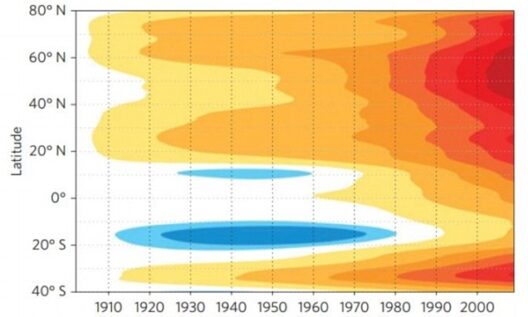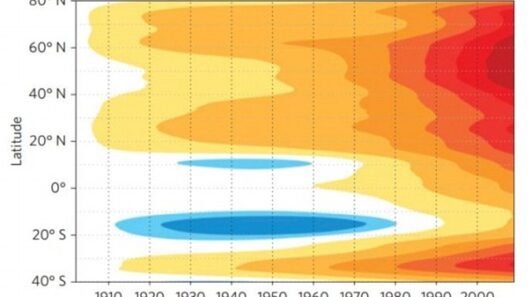In the broader tapestry of human existence, the intersection between faith and the empirical world often provokes deep contemplation. The challenge of climate change presents an especially intricate conundrum, calling upon adherents of Christianity to reconcile their spiritual beliefs with the pressing realities of environmental degradation. This discourse aims to elucidate how Christians can defend the concept of global warming while intertwining their faith with climate science.
The Christian narrative is one rich with stewardship, a profound sense of duty imbued in the very fabric of creation. Genesis 2:15 admonishes humanity to “till and keep” the Earth, positioning us as caretakers of the planet. This metaphorical garden demands not only cultivation but also protection. The analogy of humanity as a gardener underscores the responsibility bestowed upon us: just as a gardener tends to plants, nurturing them to flourish, so too must we nurture our planet, safeguarding it against the deleterious effects of climate change.
At its core, defending the reality of global warming necessitates an engagement with the robust body of scientific evidence that delineates its gravity. Thus, Christians are urged to approach climate science not as an adversary but as a concurrent ally. Scientific inquiry serves as a lantern illuminating the path toward understanding. Data from reputable sources outlines a discernible warming trend, attributing significant changes to anthropogenic factors—an argument effectively bolstered by the intergovernmental panel on climate change (IPCC) and an array of peer-reviewed studies. This scientific discourse aligns remarkably with the Christian ethos of seeking truth and wisdom.
Exploring the concept of moral imperatives, many Christians find themselves compelled to act in ways that honor the divine creation. The concept of “creation care” emerges as a pivotal theme. This term encapsulates the ethical responsibility to combat global warming aligned with Christian values. It is a faithful response, echoing the sentiments of major Christian denominations, which advocate for sustainable practices. The reclamation of creation care is reminiscent of the parable of the Good Samaritan; it calls upon believers to extend their compassion beyond immediate community boundaries to embrace the planet itself. After all, the Earth is home to countless marginalized species and ecosystems that are equally deserving of care and reverence.
Furthermore, the moral obligation to mitigate climate change can be articulated through the lens of justice. Just as Christian doctrine emphasizes equity and the defense of the oppressed, so too does it compel believers to recognize that climate change disproportionately affects the most vulnerable populations—the poor, the disenfranchised, and future generations. In chapters throughout scripture, there is a clarion call to protect those who cannot protect themselves, making the case for climate action not solely an environmental issue but a matter steeped in moral urgency.
This intersection of faith and science ignites a unique appeal when positioning action against climate change as an embodiment of discipleship—a form of living faith. Engaging in sustainable practices and advocating for environmental justice can be perceived as acts of worship. Such a notion resonates deeply with adherents, transforming environmental activism into a sacred embodiment of Christian values. It invites creativity, innovation, and collaboration among congregations, fostering initiatives that promote community gardens, renewable energy projects, and conservation efforts.
Moreover, the global context of climate change illustrates the necessity for unity among diverse faith communities. The challenge transcends geographical and cultural boundaries, demanding a collective response. Ecumenical movements, which span a multitude of denominations, emphasize the shared theological mandates to preserve the Earth. Collaborative dialogues and interdisciplinary partnerships can sow the seeds of creative solutions, maximizing impact through pooled resources and shared wisdom. The metaphor of an orchestra comes to mind, where distinct instruments harmonize to produce a beautiful symphony. In this climate action concert, every faith community becomes an essential note in the larger composition of restoration and renewal.
Engaging with climate science also affords an opportunity for Christians to reevaluate their relationship with technology. While there can be apprehension regarding technological innovations and their environmental consequences, faith can provide a framework through which to discern responsible technological advancements. The pursuit of green technologies, renewable resources, and sustainable practices can be interpreted as acts of ingenuity gifted by the Creator, imploring believers to harness innovation for the betterment of the planet. Thus, faith and reason can coexist, guiding humanity toward ecological equilibrium.
As discussions surrounding climate change progress, it is crucial to embrace the metaphor of the Ark—drawing upon the biblical narrative of Noah, who prepared in the face of calamity. Just as Noah embarked on the arduous task of constructing an ark to safeguard his family and the Earth’s creatures, modern-day Christians are impelled to build their own figurative arks. These arks may take the shape of advocacy, policy reform, and personal lifestyle changes that protect the environment and mitigate climate impacts. This proactive approach becomes not just an act of defense against global warming but a manifestation of hope; it embodies belief in a better tomorrow.
Ultimately, the dialogue on climate change transcends mere acknowledgment of scientific facts. It entails an intricate weaving of faith, ethics, and action. By engaging with climate science while remaining true to their spiritual convictions, Christians can illuminate the path forward, harnessing their collective power to care for creation. Defending the reality of global warming is not solely a scientific endeavor but rather a spiritual imperative that echoes through the tapestry of Christian belief, urging followers to steward their environment with all the reverence and respect that it warrants. In the face of an existential threat, faith must serve as both a beacon of hope and a catalyst for transformative action, leading humanity toward a more sustainable and resilient future.








